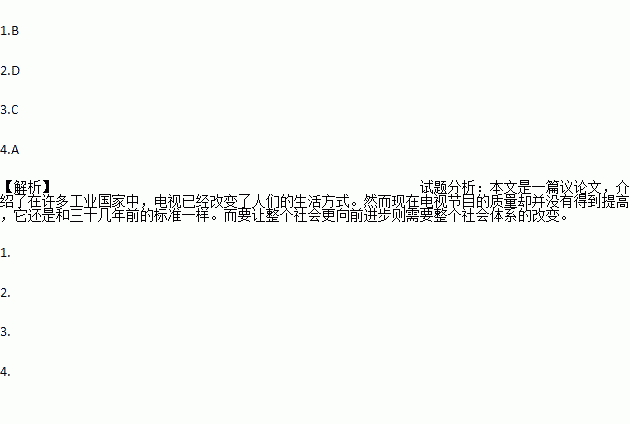题目内容
Television has changed the lifestyle of people in every industrialized country in the world. In theUnited States, where sociologists have studied the effects, some interesting observations have been made.

Television, although not essential, has become an important part of most people’s lives. It alters people’s ways of seeing the world; in many ways, it supports and sustains (维持) modern life.
Television has become a baby-sitter, an introducer of conversations, the major transmitter of culture, and a keeper of tradition. Yet when what can be seen on TV in one day is critically analyzed, it becomes evident that television is not a teacher but a sustainer; the poor quality of programming does not elevate (提高) people into greater understanding, but rather maintains and encourages the life as it exists.
The primary reason for the lack of quality in American television is related to both the history of TV programming development and the economics of TV. Television in America began with the radio. Radio companies and their sponsors first experimented with television. Therefore, the close relationship which the advertisers had with radio programs became the system for American TV. Sponsors not only paid money for time within programs, but many actually produced the programs. Thus, in American society, television is primarily concerned with reflecting and attracting society rather than experimenting with new ideas. Advertisers want to attract the largest viewing audience possible. To do so requires that the programs be entertaining rather than educational, attractive rather than challenging.[
Television in America today remains, to a large extent, with the same organization andstandards as it had thirty years ago. The hope for further development and true achievement toward improving society will require a change in the entire system.
1.According to the author, American television is poor in quality because _________.
A. it is controlled by radio companies
B. the programs have to be developed partly for economic reasons
C. advertisers are interested in experimenting with new ideas
D. it is still at an early stage of development, compared with the radio
2.In the author’s view, American TV should _________.
A. be entertaining and attractive
B. reflect society and attract society
C. maintain and encourage the life as it exists
D. change with the development of society
3.Based on the passage, which of the following statements is TRUE?
A. TV has become a must in the American’s life.
B. One can expect to improve his understanding significantly from watching TV.
C. American TV is important to most people as it affects their life in many ways.
D. American TV nowadays has some different standards from the past.
4.The author’s attitude towards American television is _________.
A. negative B. positive
C. indifferent D. sympathetic
 阅读快车系列答案
阅读快车系列答案
